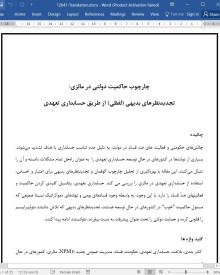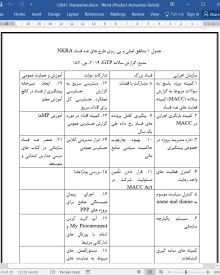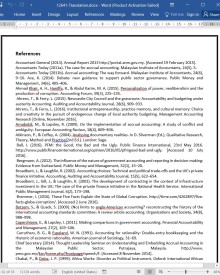
دانلود مقاله چارچوب حاکمیت دولتی در مالزی
چکیده
چالش های حکومتی و فعالیت های ضد فساد در دولت، به دلیل عدم تناسب حسابداری با هدف تشدید می شوند. بسیاری از دولت ها در کشورهای در حال توسعه، حسابداری تعهدی را به عنوان راه حل تمام مشکلات دانسته و آن را دنبال می کنند. این مقاله با بهره گیری از تحلیل چارچوب گوفمان و تجدیدنظرهای بدیهی برای اعتبار و احساس، استفاده از حسابداری تعهدی در مالزی را بررسی می کند. حسابداری تعهدی، پتانسیل کلیدی کردن حاکمیت و فعالیتهای ضدّ فساد را دارد. با این وجود، به واسطه وجود فسادهای بومی و نهادهای دموکراتیک نسبتا ضعیفی که مسئول حاکمیت "خوب" در کشورهای در حال توسعه هستند، تجدید نظرهای بدیهی که تلاش داشتند نئولیبرابیسم را قانونی کرده و حمایت دولتی را تحت عنوان پیشرفت به دست بیاورند، نتوانستند ادامه پیدا کنند.
- مقدمه
مسلما افزایش فساد دولتی در کشورهای در حال توسعه، به خاطر حسابداری های ضعیف دولت، بوده است (کوهن، گیلامون، لپسلی و رابینز، 2015). انتقادهای مربوط به حسابداری دولتی از عدم موفقیت دولت در برطرف کردن نیازهای کاربران نشات می گیرد؛ برای مثال، ارتباط نداشتن با مدیریت اقتصاد کلان (پرم چاند، 1995)، ناتوانی در شناسایی فعالیت های کلاهبردارانه و پنهان کردن رسوایی های مربوط به فساد (نوی، ایورت، راهامان و مارتینز، 2013). بسیاری از دولت های کشورهای در حال توسعه، در واکنش به کمک به بهبود حاکمیت و فعالیتهای ضد فساد، در حال توسعه حسابداری تعهدی هستند (پرایس واتر هاوس کوپرز ، 2013). این موضوع دقیقا مطابق با توصیه فدراسیون بین المللی حسابداران (IFAC) و موسسه رسمی حسابداری و مالیه عمومی (CIPFA) است، این موسسه یک چارچوب بین المللی برای حاکمیت دولتی تعیین کرده است. این اتفاق باعث اهمیت یافتن حسابداری تعهدی در بخش دولتی شد و بر لزوم تهیه گزارش بهتر از امور مالی برای کمتر شدن میزان فساد دولتی تأکید گردید (آسه 2014،CIPFA IFAC/ 2014). به طور گسترده تر، رسانه های بین المللی بر نقش حسابداری در زمینه فساد سرپوش گذاشته اند (لهمَن و تُورن 2015).
تحقیقات انجام شده پیشین، به دلیل مزایای ملموس تکنیک حسابداری تعهدی در کمک به تصمیم و پاسخگویی، به ماهیت تکنیکی آن در مدیریت منابع مالی در سازمان های بخش دولتی اشاره کرده اند (کریستیانز و رامل 2008، اِلوود و نیووبری 2007، گروت و بودینگ 2008، هیندمَن و کونولی 2011، لپسلی، میوساری و پائولسان 2009، صالح و پندلبری 2006). با این وجود، حسابداری پتانسیل بسیار بیشتری برای حاکمیت و نظارت گسترده تر دارد (فری و ادهرنز 2017، فری، اِکِرسلی و ذکریا 2015). درواقع، "انجمن حسابداری" خواستار تحقیقات بیشتر در زمینه حاکمیت و فعالیت های ضد فساد تا ببیند شیوه های محاسباتی نظیر حسابداری چگونه می توانند در مقایسه با یک پتانسیل فنی مهم، مهمتر از منطقشان باشند (احمد خیر، هنیفا و عبدالکریم 2015، لهمَن و تورن 2015). حسابداری تعهدی می تواند نقش کلیدی و حساسی در بهبود حاکمیت سازمان های بخش دولتی (IFAC/CIFPA,2014) و حفظ یکپارچگی آن ها ایفاء کند (دوگ و مَک لوُر 2003، اِسپِجو، بولا و زاراما 2001). با این وجود، اگر حسابداری صرفا در سطح منطق پتانسیل فنی اش تجزیه و تحلیل شود، ممکن است تجدیدنظرهای بدیهی اش را برای اعتبار و احساسی که باعث ایجاد حاکمیت گسترده تر و پتانسیل اقتصادی- اجتماعی می شود را فراموش کند (اهرنز و فری 2015، 2016، برادبِنت و لافلین 2002).
این مقاله، جدای از منطق فنی حسابداری تعهدی، به تجدیدنظرهای بدیهی آن پرداخته و پتانسیل اعتباری و حاکمیت و فعالیتهای ضد فساد را با بررسی این موضوعات در مالزی مورد توجه قرار می دهد. در نتیجه، در اینجا ادعاهای گفته شده در رابطه با وجود یک فساد جدی در مالزی تا سطح نخست وزیری و اعتراض به فعالیتهای ضد فساد دولتی (به عبارت دیگر، ضد دولتی)، مورد بررسی قرار می گیرد. علاوه بر این، علیرغم اینکه در گذشته و در بخش دولتی اصلاحات نئولیبرال انجام شده است، اما در مورد اینکه مردم مالزی از این اتفاق سود برده اند، تردید وجود دارد (احمد خیر و همکاران 2015). این موضوع بیشتر مصداق جامعه بین الملل می باشد، این صرفا به خاطر جهانی شدن کشورهای در حال توسعه ای مانند مالزی نیست، بلکه به خاطر افزایش مداوم میزان تجارت بین المللی و سرمایه گذاری های داخلی و خارجی است.
7. بحث و نتیجه گیری
این مطالعه به بررسی چارچوب سازی لفاظی و بلاغت مربوط اتخاذ حسابداری تعهدی در مالزی پرداخته است. یافته ها نشان می دهند به واسطه منطق فنی حسابداری تعهدی به جای حسابداری نقدی، اعتبار حسابداری تعهدی در حمایت از اهداف اقتصادی مختلف و تجدیدنظر احساسی حاکمیت اجتماعی، تجدیدنظرهای بدیهی برای یک حسابداری تعهدی کلیدی شده اند.
این مقاله، به چند صورت به مطالعات انجام شده کمک کرده است. اول اینکه، این مقاله با کمک تحلیل چارچوب گافمَن نشان داد چطور می توان تغییر همراه با تجدیدنظرهای بدیهی را برای یک منطق پتانسیل فنی و در اهداف مربوط به مدیریت مالی کلیدی و همچنین گفتمان ها و مباحث اجتماعی که در GTP به صورت بخشی از اعتبار و تجدیدنظرهای بدیهی احساسی چارچوب سازی شده اند را با استفاده از حسابداری تعهدی کلیدی کرد. GTP یعنی تغییر چارچوب تفسیری جهانی که نقش چارچوب اصلی را برای سایر برنامه های تغییر در بخش دولتی را دارد، برنامه هایی نظیر حسابداری تعهدی. بنابراین، یافته ها و نتایج این مطالعه ثابت می کنند که گفتمان های مربوط به اجرای حسابداری تعهدی، با مباحث GTP تلبیق می شونند، GTP همان چارچوب اصلی است که نظرات و توافقات مشترک پیرامون حاکمیت بخش دولتی را شکل می دهد. این کلیدی کردن دولت را قادر می سازد اعلام کند اتخاذ حسابداری تعهدی صرفا یک منطق از روش پتانسیل فنی نیست، بلکه یک چارچوب سازی از اعتبار و احساسات برای حاکمیت اجتماعی و پاسخگویی عمومی است.
یافته ها نشان می دهند استفاده از حسابداری تعهدی به صورت بدیهی چارچوب سازی شد تا برای حاکمیت خوب و فعالیت های ضد فساد سازمان های بخش دولتی جاذبه داشته باشد. ما با توجه به هنر قانع سازی ارسو و تحلیل چارچوب گافمَن متوجه شدیم کلیدی کردن منطق حسابداری تعهدی که در مشخصه های فنی اش پیچیده شده است، در بخشنامه های خزانه داری، قانون و مقررات و استراتژی های اجرایی تصریح شده توسط اداره حسابدار کل، جایگاه ویژه و مهمی دارد. وقتی منطق فنی حسابداری تعهدی در اسناد دولتی مانند بخشنامه های خزانه داری گردش داشت، نقش یک منبع توانمندسازی یک تیم اجرایی برای آرام رفتن به سمت حسابداری تعهدی را به عهده گرفتند.
Abstract
In government, the challenges of governance and anti-corruption are exacerbated by accounting not being fit for purpose. In developing countries, many governments adopt accrual accounting as a panacea. Drawing on Goffman's frame analysis, and rhetorical appeals to logic, credibility and emotion, this paper examines the adoption of accrual accounting in Malaysia. It was found accrual accounting has potential for keying governance and anti-corruption. However, rhetorical appeals that attempt to legitimate neo-liberalism and engender public support in the name of progress were hindered by perceptions of endemic corruption and relatively weak democratic institutions of ‘good’ governance common to developing countries.
1. Introduction
Public corruption, experienced by many developing countries, has been arguably exacerbated by weak governmental accounting practices (Cohen, Guillamon, Lapsley, & Robbins, 2015). The criticisms of governmental accounting stem from its failure to address the needs of users. For instance, the disconnection from macro-economic management (Premchand, 1995), its inadequacy to detect fraudulent activities, and in concealing corruption scandals (Neu, Everett, Rahaman, & Martinez, 2013). As a response, to help enable better governance practices to facilitate anti-corruption, many governments in developing countries are implementing accrual accounting (PricewaterhouseCoopers, 2013). This accords with advice from the International Federation of Accountants (IFAC) and the Chartered Institute of Public Finance and Accountancy (CIPFA) who issued an international framework for public governance. This set out the importance of accrual accounting in the public sector, and argued that better financial reporting is critical to reduce levels of public corruption (see Ace, 2014; IFAC/CIPFA, 2014). More widely, there has been coverage by international media on the role of accounting in the context of corruption (Lehman & Thorne, 2015).
Prior research has noted the technical nature of accrual accounting for sound financial management in public sector organisations (Christiaens & Rommel, 2008; Ellwood & Newberry, 2007; Groot & Budding, 2008; Hyndman & Connolly, 2011; Lapsley, Mussari, & Paulsson, 2009; Saleh & Pendlebury, 2006) especially concerning its ‘perceived’ benefits for decision usefulness and accountability (Bergmann, 2012; Laughlin, 2012). However, accounting arguably has a broader governance potential (Ferry and Ahrens, 2017; Ferry, Eckersley, & Zakaria, 2015). Indeed, ‘Accounting Forum’ has called for more research into governance and anti-corruption and how calculative practices such as accounting can be significant beyond their logic of a technical potential (Ahmad Khair, Haniffa, & Abdul Karim, 2015; Lehman & Thorne, 2015). Accrual accounting can play a key role in improving the governance of public sector organisations (IFAC/CIFPA, 2014) and in maintaining their integrity (Doig & McIvor, 2003; Espejo, Bula, & Zarama, 2001). However, if accounting is analysed merely at a logic level of its technical potential, it would miss the rhetorical appeals to credibility and emotion that engender a broader governance and socio-economic potential (Ahrens & Ferry, 2015, 2016; Broadbent & Laughlin, 2002).
This paper addresses the rhetorical appeal of accrual accounting beyond its technical logic, and considers its credibility and emotional potential for governance and anti-corruption through the case of Malaysia. This is pertinent at a time of serious corruption allegations in Malaysia up to Prime Ministerial level and public anti-corruption (and by implication anti-governmental) protests. Further, whilst there has been a history of neo-liberal reforms in the public sector it has been questioned whether the Malaysian populace has actually benefitted (Ahmad Khair et al., 2015). Such a case is particularly illustrative for the international community, not least due to the globalization of developing nations, such as Malaysia, evidenced through increasing international trade levels and inward and outward investment.
7. Discussion and conclusions
The study has examined the framing of rhetoric surrounding the adoption of accrual accounting in Malaysia. The findings show that rhetorical appeals to accrual accounting were keyed by technical logic of accrual accounting over the modified cash basis, the credibility of accrual accounting in supporting various economic objectives and the emotional appeal for social governance.
Through this study, the paper has contributed to the literature in several ways. First, using Goffman’s frame analysis, the paper has shown how accrual accounting can be used to ‘key’ change with rhetorical appeals to a logic of technical potential for financial management purposes but also with social discourses that had been ‘framed’ in the GTP as part of credibility and emotional rhetorical appeals. The GTP was the transformation of the global interpretive frame that acts as the master frame to the other public sector transformation programmes such as accrual accounting. The findings of this study therefore suggest that the discourses surrounding the implementation of accrual accounting are meshed with the discourses on the GTP, the master frame that shapes the shared understandings of public sector governance. This keying enables the government to demonstrate that the adoption of accrual accounting is not merely a logic of technical potential exercise but a framing of credibility and emotions for social governance and for public accountability.
The findings indicate that the adoption of accrual accounting was rhetorically framed to appeal for good governance and anticorruption of public sector organisations. Drawing on Aristotle’s art of persuasion and Goffman Frame analysis, we noted that the keying of logic of accrual accounting, embedded in its technical characteristics, is primarily located in the Treasury circulars, laws and regulations and implementations strategies outlined by the Accountant General. When technical logic of accrual accounting was set out in widely circulated documents in government such as Treasury Circulars, they act as a source of empowerment to the implementation team in enabling a smoother transition to accrual accounting.
چکیده
1. مقدمه
2. پیشینه مالزی و فساد
3. حسابداری تعهدی، نئولیبرالیسم و فعالیت های ضدّ فساد
4. چارچوب دادن به حاکمیت از طریق کلیدی کردن حسابداری تعهدی با تجدیدنظرهای لفظی
5. حسابداری تعهدی به عنوان تجدیدنظر بدیهی منطق، اعتبار و احساس
5.1 تجدیدنظر منطقی منطق
5.2 تجدیدنظر برای اعتبار
5.3 تجدیدنظرهای بدیهی احساس
6. حسابداری تعهدی – رفتن به ورای حاکمیت بر فعالیت های ضدّ فساد
7. بحث و نتیجه گیری
منابع
ABSTRACT
1. Introduction
2. Background to Malaysia and corruption
3. Accrual accounting, neo-liberalism and anti-corruption
4. Framing governance through keying accrual accounting with rhetorical appeals
5. Accrual accounting as rhetorical appeals of logic, credibility and emotion
5.1. Rhetorical appeal of logic
5.2. Rhetorical appeal to credibility
5.3. Rhetorical appeals of emotion
6. Accrual accounting − moving beyond governance to anti-corruption
7. Discussion and conclusions
References
- اصل مقاله انگلیسی با فرمت ورد (word) با قابلیت ویرایش
- ترجمه فارسی مقاله با فرمت ورد (word) با قابلیت ویرایش، بدون آرم سایت ای ترجمه
- ترجمه فارسی مقاله با فرمت pdf، بدون آرم سایت ای ترجمه



